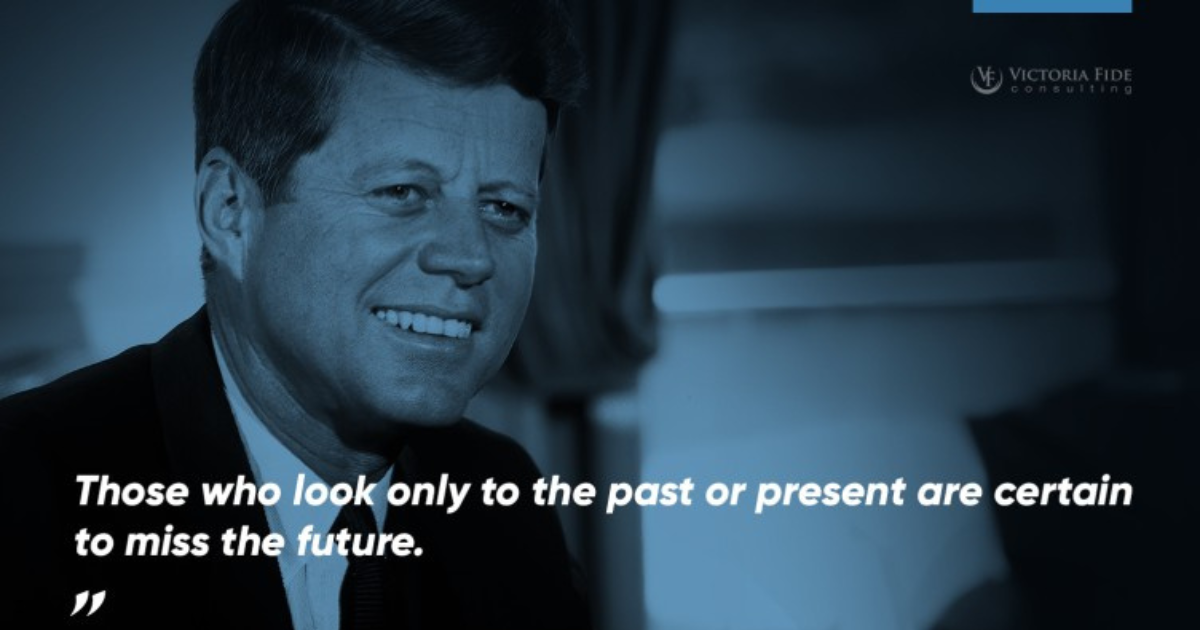
The Sage Wisdom series is produced by Victoria Fide Marketing with input and oversight from our leadership team and industry SMEs.
John Fitzgerald Kennedy (May 29, 1917 – November 22, 1963), widely known as JFK, held the esteemed role of the 35th president of the United States from 1961 until his tragic assassination in 1963. His leadership was marked by profound achievements, including propelling America to put the first man on the moon and navigating negotiations during the Cuban Missile Crisis to avoid nuclear war.
Kennedy said, “Those who look only to the past or present are certain to miss the future.” His words reflect the truth of the human tendency to dwell in the past at the expense of future opportunities, hindering the very essence of innovation and advancement that digital transformation promises. This truth highlights the indispensable—and yet often overlooked—role of organizational change management (OCM).
If businesses want to readily embrace change, they must not underestimate the importance of OCM in guiding the human facet of digital transformation toward the future. Disregarding the imperative need for effective change management deprives employees of the requisite support and knowledge to adeptly navigate the changes in the workplace. When employees are unsure of how they fit into the new norm, it can result in resistance, project setbacks, and missed prospects. This article delves into the reasons why a comprehensive approach, extending beyond technology, and fostering organizational change is the ultimate key to unlocking a prosperous digital future.
The Neglected Human Element
In the realm of digital transformation, it is common to be enthralled by the allure of innovative technology and the potential it holds for the future. However, amidst the fascination with technological advancements, it is crucial to understand the impact of the human element in the implementation process.
Within any organization, you will encounter a spectrum of responses to change. Some individuals may actively resist change, deliberately pushing back against new initiatives. Others may unintentionally resist simply due to a lack of understanding or awareness. Still others might have grown comfortable with the established way of doing things, and the prospect of change can trigger uncertainty. This divergence in attitudes and perspectives can lead to misunderstandings and misalignments within your team.

Free PDF Download
In the rapidly changing digital landscape, more and more companies are desperately trying to keep up with the competition. Download “The 10 Biggest Mistakes Businesses Make in Digital Transformation” for free today to learn how to use DX to radically transform your business and gain an edge over your competitors.
This resistance, whether intentional or unintentional, can impede the progress of your digital transformation efforts. It can slow down the pace of adaptation, create friction within teams, and lead to inefficiencies. Addressing this resistance is crucial for achieving the desired outcomes of your transformation initiatives.
Organizational Change Management: 4 Key Principles
Just as John F. Kennedy encouraged us to look to the future and understand it, the goal of effective Organizational Change Management (OCM) in the context of digital transformation is to help you and your team not only adapt to change but also embrace it. Here are four principles that can guide through the process:
Clear Communication Channels
Navigating a digital transformation requires clear communication. Consider this analogy: before the widespread use of GPS, attempting to follow directions from someone with poor communication skills often resulted in taking a wrong turn or missing the destination entirely. Clear and consistent communication during change initiatives is like having a reliable map that ensures everyone knows where you are headed, what is changing, and why.
Leadership Alignment and Support
When leaders are aligned with the changes and actively support them, it sets the tone for the entire organization. Leaders need to lead by example, showing that they believe in the transformation as they steer the organization toward a new and better future. By providing sufficient resources and support to the transformation team, leaders can steer the initiative toward a successful finish.
Employee Engagement and Involvement
Involving employees in the transformation process is crucial. When they have a say and feel part of the changes, they are more likely to buy into the new way of doing things. It plants a seed of enthusiasm that helps shift people’s perspective from the way things have always been to the way things could be.
Structured Change Management Approach
Successful OCM requires dedicated resources and a structured approach. Invest in OCM resources, programs, and training to empower your team throughout the transformation journey. An effective change strategy is your blueprint for a successful digital transformation.
Take control of your project’s success today and schedule a free 30-minute consultation with Tory Bjorklund, the founder and CEO of Victoria Fide. With our expertise, we can rescue your ERP implementation, saving you valuable time and money. Find the answers you seek by taking this crucial step toward a successful ERP implementation.

6 Strategies for Building a Change-Ready Culture
Building a change-ready culture is all about embracing change and innovation. By cultivating a culture that is open to change and innovation, you are not just preparing for the future – you are actively creating it.
Remember, change is not something to be feared; it is an opportunity for growth and improvement. Here are six strategies to equip your organization with the change-ready culture needed in this quickly evolving world:
Fostering Openness to New Ideas
To build a change-ready culture, you need to cultivate an environment where employees feel comfortable sharing their thoughts and innovations. Encourage brainstorming and make it clear that innovative ideas are not just welcome but celebrated.
Promoting Continuous Learning
Encourage a culture of continuous learning and development. Provide opportunities for training and skill-building. When your team feels they are growing and evolving, they are more likely to embrace change because it represents a chance to learn something new and exciting.
Celebrating Successes
In your organization, acknowledge and celebrate successes, no matter how small they may seem. This reinforces the idea that change and innovation lead to positive outcomes.
Leading by Example
Leadership by example shows the way forward. When you lead by example you set the tone for your organization’s culture. Leaders who enthusiastically embrace change and innovation send a powerful message to everyone else.
Adapting to Feedback
Encourage feedback from your employees and stakeholders. Listen carefully and adjust based on their insights. This not only helps you navigate change more smoothly but also shows that you value everyone’s input.
Embracing Failure as a Learning Opportunity
Instead of fearing failure, encourage your team to see it as a valuable learning opportunity. Reframing your perception of failure can turn setbacks into a springboard for future success.
Embracing a Digital Future
In this article we emphasized the pivotal role of organizational change management (OCM) in a DX initiative. Just as JFK wisely said, “Those who look only to the past or present are certain to miss the future,” this lesson underscores the importance of guiding people in forward thinking.
The human factor, often overshadowed by technology’s allure, is key to success. Be it resistance, hesitation, or team alignment issues, addressing these human dynamics is paramount. Further, we highlighted the core principles: clear communication, leadership alignment, employee engagement, and structured change management. These principles drive not only adaptation but also foster an innovation-driven culture.
Digital transformation is about people, not just technology. By understanding the human tendency to remain stuck in the past and present, leaders can use OCM to help guide their team toward a future of innovation. Apply the four OCM principles to shape your organization’s culture, allowing them to view change is an opportunity, not a fear. With a future-focused team, your organization will thrive in the evolving digital landscape.
DX Insights Newsletter: Victoria Fide’s monthly digest is for business leaders wanting to stay at the forefront of digital transformation trends and gain valuable insights into the ever-evolving landscape of technology and innovation. Subscribe Today: It’s Free!

Subscribe to our weekly LinkedIn Digital Transformation Success newsletter and get notified of each new edition.
